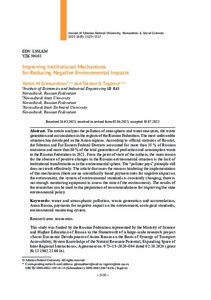Совершенствование институциональных механизмов сокращения негативного воздействия на окружающую среду
Автор:
Гильмундинов, В. М.
Тагаева, Т. О.
Gilmundinov, Vadim M.
Tagaeva, Tatiana O.
Дата:
2023-09Журнал:
Журнал Сибирского федерального университета. Гуманитарные науки. Journal of Siberian Federal University. Humanities & Social Sciences; 2023 16 (9)Аннотация:
В статье анализируется загрязнение атмосферных и водных ресурсов,
образование и накопление отходов в регионах РФ. Наиболее неблагоприятная ситуация
сложилась в азиатских регионах. Согласно официальной статистике Росстата, на долю
Сибирского и Дальневосточного федеральных округов в 2021 г. приходилось более 35 %
общероссийских выбросов загрязняющих атмосферу веществ и более 80 % общего
образования отходов производства и потребления в РФ. С точки зрения авторов статьи,
основная причина отсутствия положительных изменений в российской экологической
ситуации – отсутствие институциональных преобразований в природоохранной
сфере. До сих пор эффективно не работает принцип «загрязнитель платит». В статье
обсуждаются причины, мешающие реализации этого механизма (отсутствие научно
обоснованных ставок платежей за негативное воздействие на окружающую природную
среду, несовершенство нормативной экологической системы, проблемы мониторинга
качества окружающей среды). Результаты исследования могут быть использованы
при подготовке рекомендаций по совершенствованию государственной экологической
политики The article analyzes the pollution of atmospheric and water resources, the waste generation and accumulation in the regions of the Russian Federation. The most unfavorable situation has developed in the Asian regions. According to official statistics of Rosstat, the Siberian and Far Eastern Federal Districts accounted for more than 35 % of Russian emissions and more than 80 % of the total generation of production and consumption waste in the Russian Federation in 2021. From the point of view of the authors, the main reason for the absence of positive changes in the Russian environmental situation is the lack of institutional transformations in the environmental sphere. The “polluter pays” principle still does not work effectively. The article discusses the reasons hindering the implementation of this mechanism (there are no scientifically based payment rates for negative impact on the environment, the system of environmental standards is constantly changing, there is not enough monitoring equipment to assess the state of the environment). The results of the researches can be used in the preparation of recommendations for improving the state environmental policy

